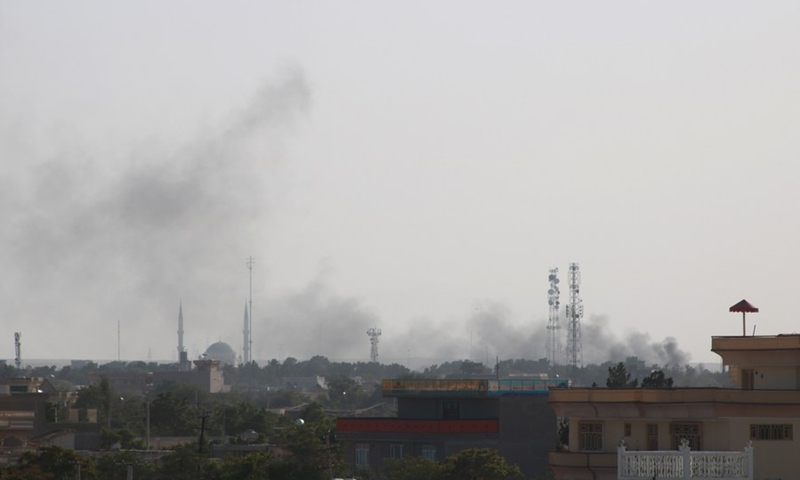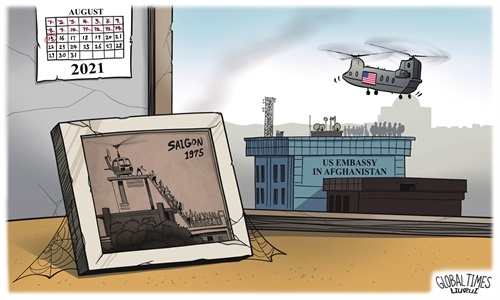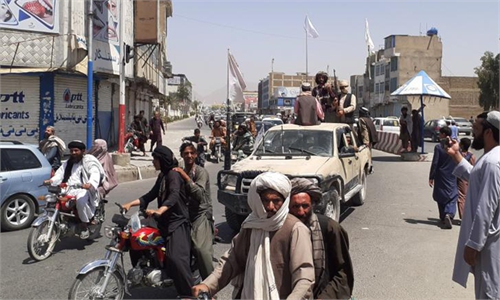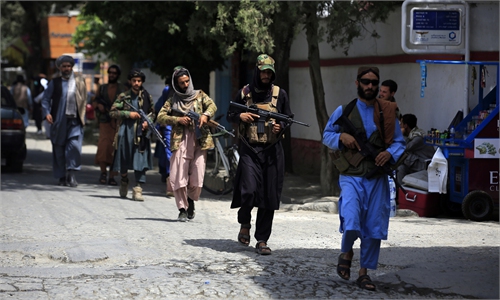GT Voice: China, Europe should cooperate to help Afghanistan as US evades responsibility

Photo taken on Aug. 6, 2021 shows smoke rising during gun fights in Shiberghan, capital of Jawzjan Province, Afghanistan. (Photo: Xinhua)
The drastic change in Afghanistan has provided a renewed opportunity for cooperation between China and the EU as both sides have economic interests in the region. Such cooperation is not only urgently needed in Afghanistan but is also conducive to promoting stability and development in the country.
How to properly handle the fallout of the US' chaotic withdrawal from Afghanistan has dominated recent discussions across the international political spectrum. It is undeniable that the war-torn country still has a long way to go to achieve peace and stability. But it's also clear that cooperation and support from the international community will be crucial for the country's rebuilding efforts.
US President Joe Biden is set to meet Group of Seven (G7) leaders at a virtual meeting on Tuesday. The purpose of the meeting is reportedly to coordinate a common approach to the crisis in Afghanistan, but it is hard to believe that the meeting will result in anything that will be enough to calm the anger and disappointment of several European allies toward the US' sudden and chaotic withdrawal.
What has happened in Afghanistan proves that Washington is an unreliable partner that will always sacrifice others to protect its own core interests. European leaders should be more aware than ever of the fact that the interests of Europe and the US are not always aligned.
Therefore, with the US looking to evade the responsibility it should take after directly causing the chaotic situation in Afghanistan, European leaders should see that the best course of action is to strengthen cooperation with China based on not only their own interests but also the dire need of Afghanistan and the region.
Chinese companies are currently engaged in several oil, copper mine, road and power generation projects across Afghanistan, while the EU also has companies involved in power generation and other industries. While the domestic political turmoil has suspended most economic activities, it is hoped that once order is restored and reconstruction starts in the country, those projects, which are greatly beneficial for the livelihood of Afghans, will be able to resume operations.
It is in the common interests of both China and the EU to promote peace and development in Afghanistan. If both sides continue to work in the same direction of promoting development in the war-torn country, then there will certainly be opportunities for cooperation when the current crisis abates in the future.
For example, if the US uses its dollar hegemony to sanction against Afghanistan, financial cooperation between China and the EU with the rising status of the euro and the yuan may help the country out. Also, since both Chinese and EU companies are involved in power sector in Afghanistan, they may cooperate on future technological exchanges and supplies of relevant parts and equipment.
Certainly, some politicians from the EU may be concerned about their interests in Afghanistan and oppose potential cooperation with China just because of political differences. This zero-sum mindset has already caused too much time-wasting and unnecessary confrontation, and Afghanistan has seen enough of these political power plays. A repeat of the same play would be the last thing ordinary Afghans need.
China and the EU need to play a constructive role in avoiding further escalation of tensions and in promoting peaceful development in the region. Moreover, enhancing China-EU cooperation in a third-party country represents a good opportunity to improve mutual understanding and trust based on common interests between the two sides.



